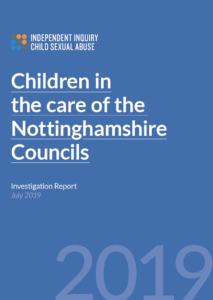Another independent inquiry has published its report into child sexual abuse. Entitled “Children in the care of the Nottinghamshire Councils”, the report’s authors – Professor Alexis Jay, Professor Sir Malcolm Evans, Ivor Frank, and Drusilla Sharpling – have done a thorough job. Their conclusions are devastating.
They received evidence from 350 complainants who allege sexual abuse while under the care of the Nottinghamshire Councils. The abuse included rape, sexual assault, voyeurism, and inappropriate sexual contact. The authors conclude that the sexual abuse of children in the care of Nottinghamshire Councils was widespread between the 1970s and the 1990s. Most of the abuse was perpetrated by foster carers and staff in residential homes. Senior managers failed to prioritise residential care even when they were aware of the rising number of allegations of sexual abuse.
One of the striking aspects of the abuse was the failure of so many people to “see” what was happening. Local GPs, nurses and mental health staff based in the city or county, or those linked specifically to the residential units could have been the “eyes and ears” registering the abuse; they could have played a role as confidants for vulnerable youngsters, documenting physical bruises as well as emotional distress. A striking element of the inquiry report is that it barely mentions the role of medical or community health staff who would have seen the children. Although detailed regulation to provide good health care for children looked after did not come into place until the Children Act 1989, medical arrangements for protecting the health of the children in residential care were required as far back as the Children Act 1948. And the abuse in Nottinghamshire went on until the 1990s.
Child sexual abuse (CSA) is particularly difficult to document. Indeed, two-thirds of victims of CSA do not disclose during childhood. And only one-quarter ever disclose what happened to them.
Part of the problem is that many vulnerable young people have no outside person that they see regularly and can trust – such as a social worker – to talk to. There were “severe staffing shortages” in the units themselves and many “unallocated” children, i.e. who did not have a named social worker attached to them by the Social Services department. Cutbacks in public services mean there is little time for medical or social care professionals to develop relationships of trust with the children they are expected to help. In some of the residential units, a sexualised culture meant that staff’s behaviour towards children was “wholly inappropriate.” It laid the groundwork for the sexual abuse of children by adults and for harmful sexual behaviour between vulnerable children.
Children may be afraid they will not be believed if they disclose the abuse; they may not recognise some of the behaviours as abusive at the time; or they may fear for their safety. The trauma of sexual abuse also creates or exacerbates mental and physical health problems that render children incapable of disclosing, even given opportunities. The situation is more difficult when the vulnerable young person is disabled, does not speak English, or comes from a religious minority. Survivor A79 told the inquiry that the perpetrator told him “it was their ‘secret’ and that, if anyone found out, he would make A79’s life hell and make it ‘twice as bad’ next time.” A79 said, “There was no way I was going to tell anyone as I was scared and sure that no-one would believe me and was deeply ashamed.”

The independent inquiry draws attention to high levels of poverty in parts of Britain. They point out that the relatively high proportion of children in care in Nottingham is largely a product of economic and social deprivation. Resources for caring for young, vulnerable populations are low; investment in training care-workers is poor. Ironically, while successive governments have recognised the need to ensure high quality care for vulnerable children, the political push to outsourcing means that private companies now make healthy profits from the public purse, whilst local authority and NHS social services are squeezed. Three-quarters of children’s homes were provided by for-profit companies by March 2018. Nearly forty per cent of all fostered children were in placements arranged through for-profit agencies.
Higher investment in training staff to listen to children and recognise the signs and signals they are giving about abuse is needed, as well as strong leadership that enable medical and social care staff to overcome anxieties about reporting on suspicions and combat the culture of denial which exists beyond the gates of children’s homes and foster carers’ houses.
The solution lies in more widespread societal reforms. In the meantime, an important step is to tackle a culture of disbelieving victims. As Louise Hide and Joanna Bourke argue in their introduction to a special edition of the journal Social History of Medicine, we need to learn more about “ideologies that legitimise harm and mechanisms that perpetuate them through systems of complicity and complacency, normalisation and neutralisation, denial and disavowal at a societal, political, institutional, group and individual level”.
The report on “Children in the care of the Nottinghamshire Councils” is an important step in that direction.
RELATED READING:
The full report of the independent inquiry as well as the article by Louise Hide and Joanna Bourke can be read in the Resources section of our website. They can also be found here:
Independent Inquiry into Child Sexual Abuse
Children in the care of the Nottinghamshire Councils Investigation Report
Published: 31 July 2019
Louise Hide and Joanna Bourke
‘Cultures of Harm in Institutions of Care: Introduction’
Social History of Medicine, Volume 31, Issue 4, November 2018, pp. 679–687
https://doi.org/10.1093/shm/hky103
Published: 19 November 2018
On increasing privatisation of children’s services, see:
‘Private foster care agencies increasing cost of finding children homes’
The Guardian
Published: 30 January 2018
Statutory guidance on the health of looked-after children can be found at:
Promoting the health and wellbeing of looked-after children
GOV.UK
Published: 17 March 2015